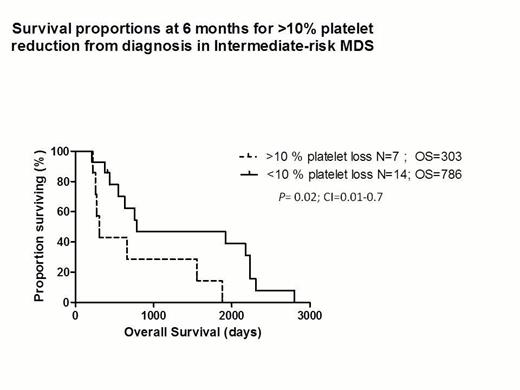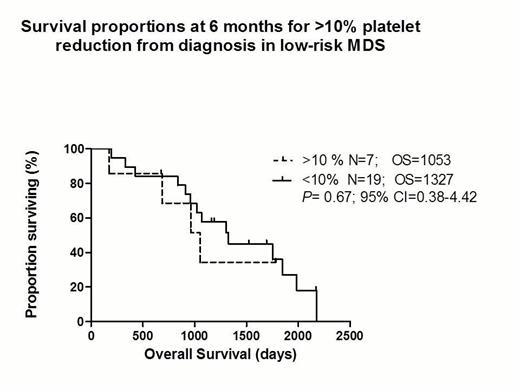Abstract
Low-risk MDS (LR-MDS) is a clinically, genetically and epigenetically diverse disease characterized by progressive cytopenias. Within LR-MDS subsets have been identified as having aggressive biological behavior and shorter overall survival (OS). Fixed single time point covariates contained in R-IPSS prioritizes MDS risk prediction based on novel redefined blast percentage, 5 cytogenetic subgroups and depth of cytopenias at disease initiation, and time-dependent IPSS/WPSS facilitates prediction of survival during disease evolution. Given the role thrombocytopenia and neutropenia in predicting survival at disease initiation, we sought to investigate whether time –dependent platelet count worsening could segregate patient (pts) with inferior outcome in low and intermediate risk MDS.
From 2000-2012, 30/124(24%) and 32/124 pts (26%) with confirmed diagnosis of intermediate and low-risk R-IPSS MDS, respectively, were identified from the Michael E. Medical Center Cancer Registry. Pts were included for analysis if: (1) ≥ 2 follow up sequential platelet counts values were available; (2) at time of recording counts no clinical or laboratory evidence of sepsis, infection or disseminated intravascular coagulation (DIC) was observed. An initial exploratory percentile level decline in platelet count (30th vs. 20th vs. 10th) strategy aimed at identifying statistically significant correlation between platelet reduction and survival identified 10th percentile as strong predictor of long-term-survival. Median survival was calculated for pts whose platelet count has fallen within ≥ or ≤ 10th percentile from baseline at predetermined time points. Multivariate Cox regression analysis was performed to assess the impact of multiple independent variables on clinical outcomes including blast count, cytogenetic risk, R-IPSS, WHO 2008 category, MDS directed therapy and age.
21 pts (median age 72 years, range, 53-82) in intermediate risk and 18 pts (median age 75, range, 53-88) in low-risk matched study criteria. Characteristics of pts with platelet count achieving ≥ or ≤ 10th percentile from baseline are summarized in table 1. In Intermediate R-IPSS group, 7 pts experienced reduction of platelet count falling below 10th percentile (median baseline and 6 months platelet count were 309000 and 160000, respectively, P=0.10). With a median follow- up of 16.1 m for intermediate risk, 3-y estimate OS was 60%. For intermediate risk pts experiencing ≥ or ≤ 10% percentile reduction, median OS at 6m was 303 days (d) vs 786 d, respectively, P=0.02 (Fig.1) No statistically significant differences were detected at 6 m OS survival median in low-risk subsets (Fig.2). Univariate analysis identified only higher proportion of blast at disease initiation with trend toward risk factor for unfavorable outcome (P=0.06).This correlation was not observed by multivariate analysis.
Our study showed that progressive thrombocytopenia in intermediate-risk MDS could suggest feasibility of group disease heterogeneity. 10% platelet count reduction in intermediate-risk but not low-risk R-IPSS MDS could identify pts with inferior outcome. Larger coalesced studies including intermediate risk MDS pts with steady/progressive platelet attrition could facilitate recognition of variable involved in faster disease progressors and assist in identification of pts suitable for investigational interventions.
Characteristics of patient with ≥ or ≤ 10% platelet count reduction.
| ≥ 10% Reduction N=7 . | ≤ 10% Reduction N=14 . | P-value (CI) . | |
|---|---|---|---|
| Median age (range) | 73 (59-85) | 63(57-82) | NS |
| WHO 2008 classification RCMD RCUD RAEB-1 RAEB-2 Unclassified | 5 1 1 | 12 1 1 | |
| Median blast count (range) | 3(3-15) | 5(0-8) | NS |
| Cytogenetic group Good Poor | 6 1 | 11 1 | |
| Median R-IPSS score (range) | 3.5 | 3.75 | NS |
| Median OS (days) | 303 | 785 | 0.02 (0.01-0.7) |
| ≥ 10% Reduction N=7 . | ≤ 10% Reduction N=14 . | P-value (CI) . | |
|---|---|---|---|
| Median age (range) | 73 (59-85) | 63(57-82) | NS |
| WHO 2008 classification RCMD RCUD RAEB-1 RAEB-2 Unclassified | 5 1 1 | 12 1 1 | |
| Median blast count (range) | 3(3-15) | 5(0-8) | NS |
| Cytogenetic group Good Poor | 6 1 | 11 1 | |
| Median R-IPSS score (range) | 3.5 | 3.75 | NS |
| Median OS (days) | 303 | 785 | 0.02 (0.01-0.7) |
No relevant conflicts of interest to declare.
Author notes
Asterisk with author names denotes non-ASH members.



